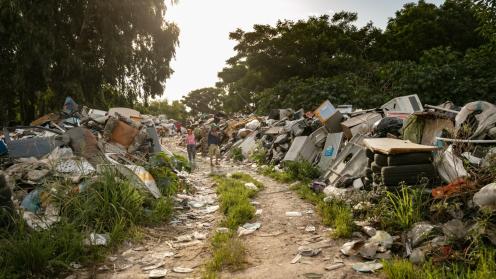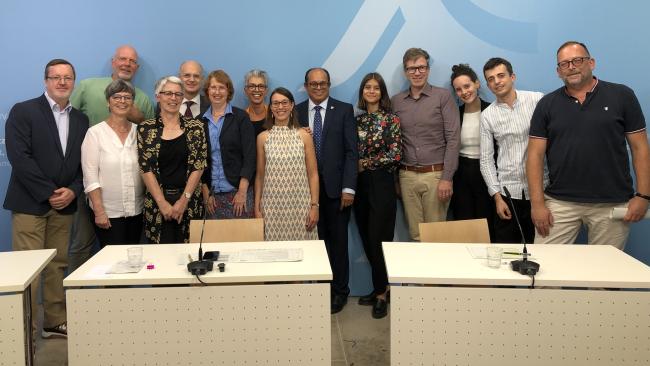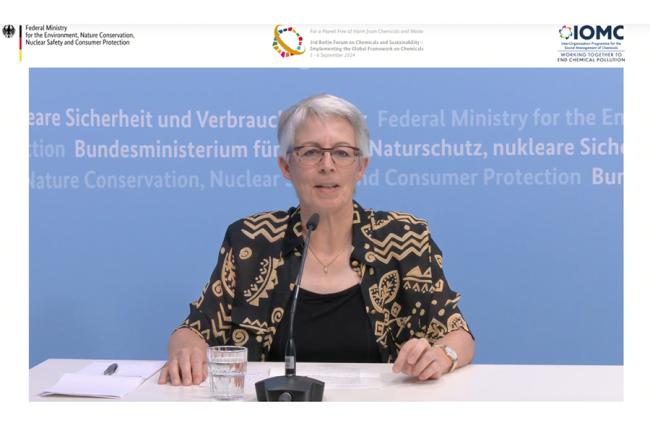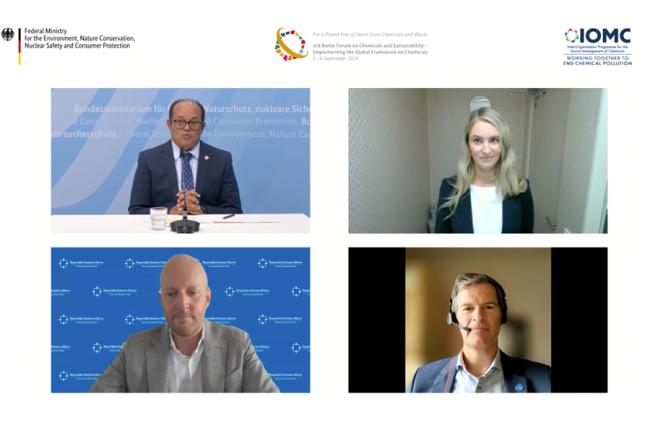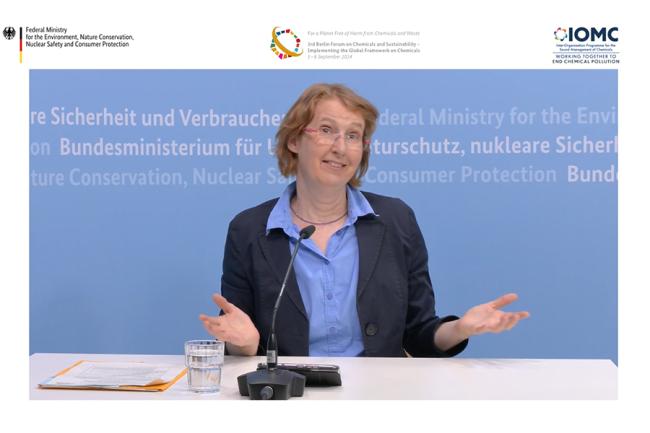Implementing the Global Framework on Chemicals (GFC) requires cooperation among all stakeholders along the chemicals value chain, as well as innovative financing to support the transition towards the safe and sustainable management of chemicals. This was one of the key messages from the second and final day of the 3rd Berlin Forum on Chemicals and Sustainability.
Addressing participants, Anita Breyer, President, 5th session of the International Conference on Chemicals Management (ICCM5), noted she had viewed the Forum as an opportunity to remind everyone of the GFC’s to-do list, but expressed her pleasure that the Forum’s opening day showed that there is so much work already underway. She urged discussions on how to achieve the needed change along the entire chemicals value chain, underlining that the upstream and downstream sectors must work together for safer products for a planet free from harm.
Subsequently, discussions were held in two thematic sessions. The first session focused on “Transforming Product Value and Supply Chains: Taking Stock of and Scaling Up Sustainable Solutions by Industry and Other Stakeholders.” In her keynote, Anne-Sofie Bäckar, Executive Director, ChemSec, described her organization’s support to the chemicals industry, including through publishing a list of which chemicals may be regulated and outlining what action the industry can take in response. She observed that “anticipation of regulation drives innovation.” Mark Rossi, Executive Director, Clean Production Action, discussed possible key performance indicators for downstream sectors, including: corporate chemicals policies that address the need to reduce chemical footprints and grow safer solutions; and transparency and reporting.
In a series of short statements, industry and stakeholder group representatives offered further insights on practical tools and approaches that are underway to advance Strategic Objective D of the GFC, which calls for safer alternatives and innovative and sustainable solutions in product value chains.
The second session considered “Strengthening Innovative Financing for GFC Implementation: Exploring Novel Business Models and the Role of Financial Investors.” In his keynote, Richard Damania, Chief Economist, Sustainable Development Practice Group, World Bank, highlighted three priorities: building government capacity for the sound management of chemicals; research and development to create safe chemicals; and building public support for regulation and change. Eric Usher, Head, UN Environment Programme (UNEP) Finance Initiative, highlighted relevant developments in the financial sector, including: the evolving concept of dual materiality – the risks that business poses to the environment, and the risks the environment poses to business; and the gradual transformation of voluntary environmental disclosure frameworks into mandatory forms.
Following this, representatives of multilateral development banks and funds discussed ways to shift financial flows towards sustainable chemistry, including partnerships between the private sector and financial institutions, and improved use of grants and blended financing.
In a closing high-level segment, ministerial representatives from India, Chile, Mexico, Rwanda, Brazil, and the Philippines, addressed the Forum, outlining national initiatives on chemicals management. Tedros Adhanom Ghebreyesus, Director-General, World Health Organization (WHO), and Catherine Russell, Executive Director, UN Children’s Fund (UNICEF), urged accelerated action to prevent further impacts on health, especially children’s health.
Kay Williams, Head of the GFC Secretariat, Chemicals and Health Branch, UNEP, reflecting on the Forum discussions, noted willingness to collaborate and appreciated the strong participation from the health and labor sectors in the deliberations. She underscored that the GFC provides a unique framework to work across value chains, bringing all stakeholders together.
In closing reflections, Christiane Rohleder, State Secretary, BMUV, Germany, thanked the IOMC and its 10 member organizations for their substantive contribution to the Forum and to ongoing efforts to support multistakeholder and multisectoral programmes at the country level. She highlighted examples of initiatives underway to kickstart GFC implementation, including a capacity-building programme for African countries by the International Council of Chemicals Associations.
To receive free coverage of global environmental events delivered to your inbox, subscribe to the ENB Update newsletter.
Transforming Product Value and Supply Chains: Taking Stock of and Scaling-up Sustainable Solutions by Industry and Other Stakeholders
Strengthening Innovative Financing for GFC Implementation: Exploring Novel Business Models and the Role of Financial Investors

A slide from the presentation by Stephanie Lindemann-Kohrs, Director, Global Head Equity and Funds, at KfW Development Bank

Panel discussion for the session (clockwise from left): Co-Moderator Rolph Payet, BRS Conventions Executive Secretary; Karianne Lancee, Head of SI Portfolio Integration, UBS Asset Management; Claude Gascon, Director of Strategy and Operations, GEF; and Yoko Watanabe, Director of Environment, Asian Development Bank (ADB)
